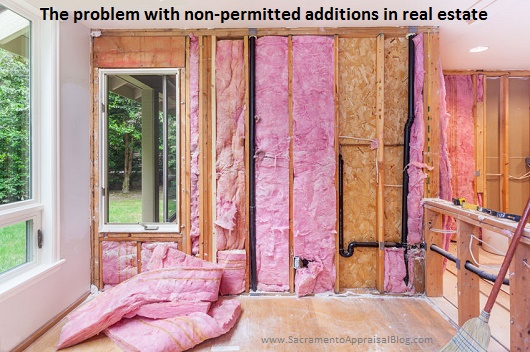
Issues when dealing with a lack of permits:
-
Lenders & Appraisers: Here’s the bottom line. Some lenders don’t want to lend on properties with non-permitted additions. In short, a non-permitted area might have legitimate value in the market, but some lenders will tell appraisers NOT to give the space any value. At the same time other lenders are okay with value being given, but they want appraisers to show a few comps with similar non-permitted areas to prove the market is willing to pay for the space (that’s tricky to find).
-
Illegal: Does the addition conform with what zoning allows? This is a key question. For instance, if zoning only allows one unit and the seller has a non-permitted second unit that hands-down would never be allowed, it’s an enormous liability for an appraiser to be giving value to something like that. Likewise, imagine if an addition was built within the setbacks on a site, which would make it illegal and maybe even a safety issue.
-
Building Department Reaction: Is it likely the non-permitted area can become permitted? What is it going to cost? This is where it’s worth giving the building department a call. I don’t recommend mentioning a specific address at first so you don’t raise red flags, but call and maybe ask about a hypothetical situation to see what the cost and feasibility might be for getting permits. Remember, not all markets are the same either. For instance, since 1976 the City of Davis has had a program where building inspectors visit all properties before they close escrow to ensure there are no code violations. In short, you can’t get away with non-permitted additions in Davis if you plan to sell (but you can elsewhere).
-
The Struggle of Different Opinions: A friend gave me a call to talk through a situation with a garage that was converted into a second unit without permits. The appraiser gave little weight to the addition because of zoning issues, but the seller thought it should have carried more weight. There was a solid back-up offer on the table, but regardless of whether this addition was worth more or not, the thing I told my friend was there was no guarantee a future appraiser or lender was going to see the situation any differently. Owners in scenarios like this tend to say, “The lack of permits wasn’t a problem when we first bought the house”, but guidelines and what appraisers report might have changed over time. Moreover, not every appraiser or lender is going to see things the same way.